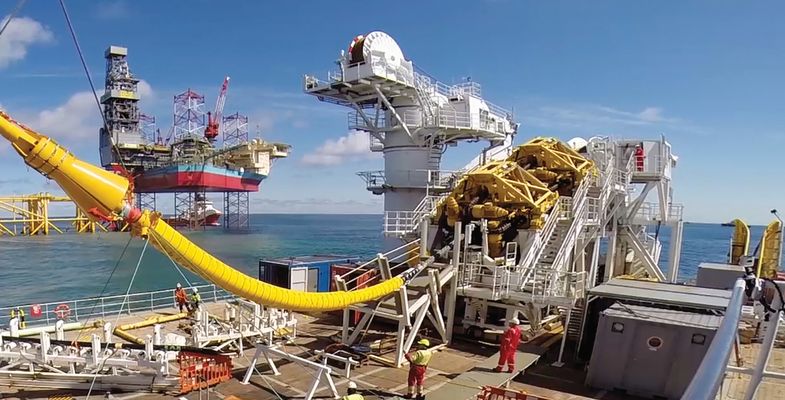IEC 61892-4 Electrical Safety Testing of Offshore Installations
The IEC 61892 series addresses safety and performance requirements for electrical installations used in offshore wind farms, including substations. The standard is crucial for ensuring the integrity and safety of these facilities, which are exposed to harsh marine environments that can significantly impact electrical equipment.
IEC 61892-4 specifically focuses on the electrical safety testing of offshore installations. This includes tests aimed at verifying the insulation resistance, dielectric strength, and grounding of cables and other components. The standard is designed to ensure compliance with international best practices for preventing electrical faults that could lead to accidents or failures.
Offshore wind farms are critical infrastructure for renewable energy generation, but they operate in challenging conditions where traditional onshore standards may not be applicable. IEC 61892-4 provides a framework for testing that accounts for the specific environmental stresses faced by these installations. This includes exposure to saltwater, high humidity, and severe weather conditions.
The tests outlined in this standard are essential for verifying the reliability of electrical components under operational stress. For instance, insulation resistance tests check the integrity of cable insulation, ensuring it can withstand the harsh marine environment without degradation. Dielectric strength tests assess the ability of cables to resist voltage breakdown, a critical factor given the high voltages typically used in offshore wind farms.
Grounding and bonding are also key aspects addressed by IEC 61892-4. Proper grounding is vital for preventing electrical faults that could lead to fires or electrocution hazards. The standard provides detailed protocols for testing ground continuity and potential differences, ensuring the safety of personnel and equipment.
The tests in this standard are not merely theoretical; they have practical implications for the longevity and reliability of offshore wind farms. By adhering to IEC 61892-4, operators can ensure their installations meet or exceed international standards, reducing the risk of failures that could disrupt operations and compromise safety.
In summary, IEC 61892-4 is a cornerstone for ensuring electrical safety in offshore wind farms. It provides a robust framework for testing that addresses the unique challenges posed by marine environments. Compliance with this standard is essential for maintaining reliable, safe, and sustainable energy generation from offshore installations.
Why It Matters
The importance of IEC 61892-4 cannot be overstated in the context of renewable energy, particularly in offshore wind farms. The standard is pivotal for several reasons:
It ensures that electrical installations are safe and reliable under harsh marine conditions.
It helps prevent accidents caused by electrical faults or failures due to environmental stressors.
Compliance with the standard enhances the longevity of offshore wind farms, ensuring they operate efficiently over extended periods.
The tests provide critical data that can inform maintenance schedules and predictive analytics for better resource allocation.
IEC 61892-4 supports the broader goal of sustainable energy production by promoting reliability and safety in offshore installations.
In essence, adherence to this standard is not just about compliance; it's about ensuring the integrity and safety of critical infrastructure that plays a vital role in global energy transition efforts.
Eurolab Advantages
At Eurolab, we offer comprehensive testing services for IEC 61892-4 compliance with a focus on meeting the highest standards of safety and reliability. Our advantages include:
Absolute commitment to quality and accuracy in every test conducted.
Access to state-of-the-art facilities equipped specifically for testing offshore installations.
Experienced technicians with deep knowledge of IEC standards, ensuring thorough and reliable testing.
Comprehensive reporting services that provide clear insights into the test results and recommendations for any necessary actions.
Support for certification processes, ensuring your offshore installations meet all required regulatory and safety requirements.
With Eurolab, you can rely on a partner that understands the unique challenges of working in the energy sector. Our expertise and resources are dedicated to helping you achieve compliance with IEC 61892-4 while ensuring the highest levels of safety and reliability for your installations.





